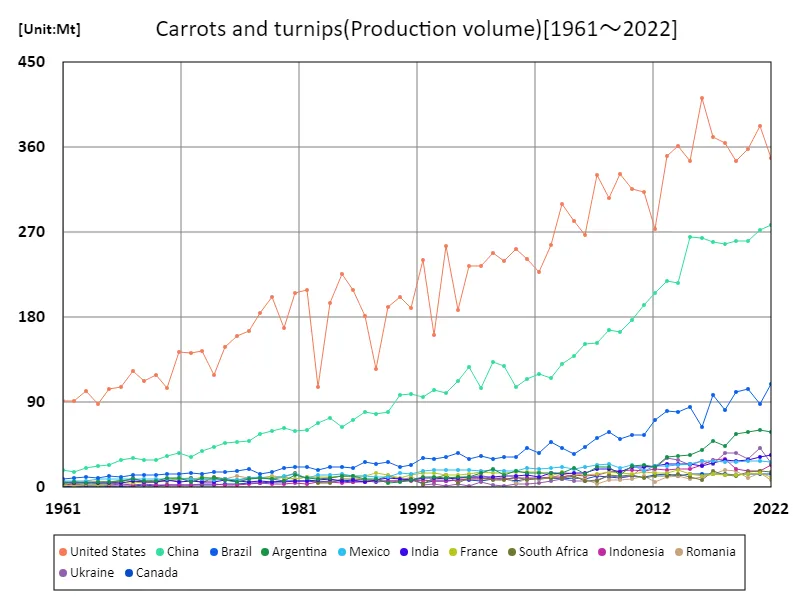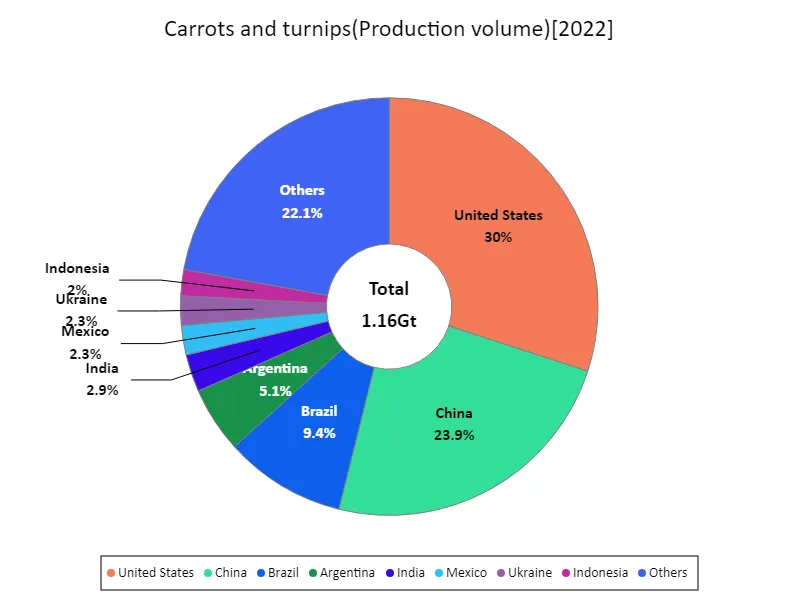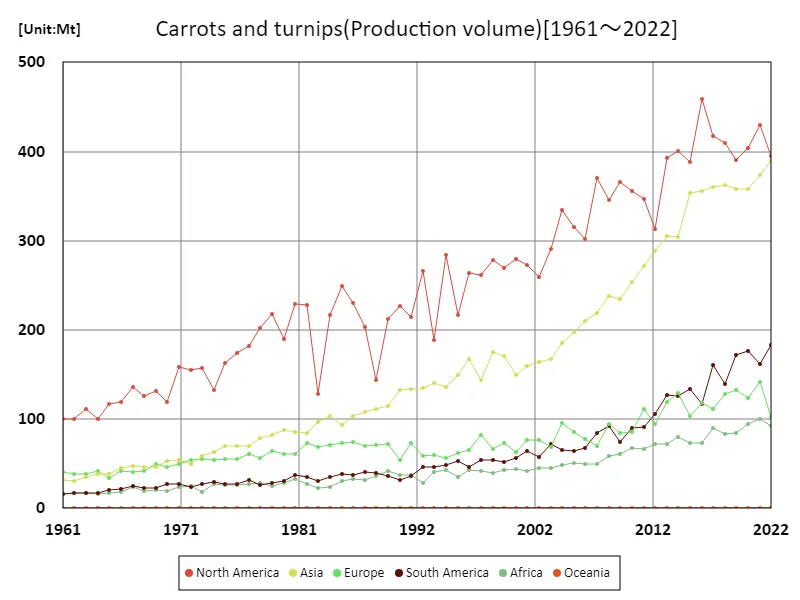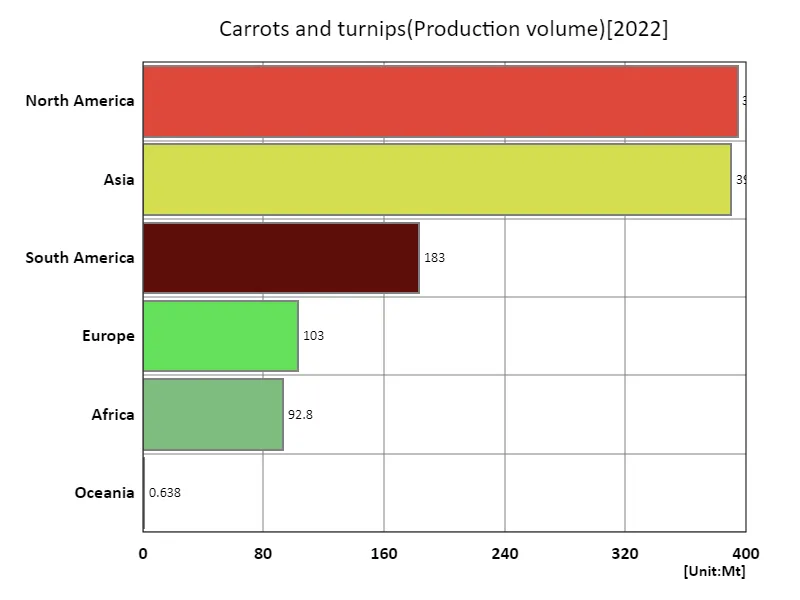Abstract
Are you looking for a summary focusing on global export volumes, or would you prefer an overview of production trends and characteristics?
Carrot and turnip export volumes (worldwide)
Since 1961, global carrot and turnip production has evolved significantly. Initially, production was dominated by countries with established agricultural traditions. By 2021, the U.S. reached a peak production level of 70.6 Mt, reflecting advances in farming technology and efficiency. Historically, production trends showed a gradual increase due to improved agricultural practices and higher demand. The U.S. leading with 100% of its peak highlights its role as a major producer. Overall, the global landscape has seen shifts in leading producers and changing export dynamics, driven by technological progress and market demands.


The maximum is 412Mt[2016] of United States, and the current value is about 84.6%
Carrot and turnip export volumes (latest year, countries around the world)
In 2021, global carrot and turnip production reached a peak of 206 Mt, with the U.S. leading at 70.6 Mt, reflecting its advanced agricultural practices and significant market share. The average production across all countries was 1.28 Mt. Historically, production has risen steadily due to improvements in farming technology and increased demand. The U.S.’s dominance underscores its efficient production systems, while global trends reveal a shift towards larger, more productive operations. This period marks a high point in production, illustrating both technological advancements and evolving market dynamics.


The maximum is 349Mt of United States, the average is 6.88Mt, and the total is 1.16Gt
Carrot and turnip exports (continent)
In 2021, South America led global carrot and turnip production with a peak of 82.3 Mt, showcasing its significant role in the agricultural sector. Historically, production trends have shifted towards this region due to favorable growing conditions and advancements in agricultural practices. South America’s rise to the top reflects increased efficiency and investment in farming technology. This shift highlights a broader trend of growing agricultural capacity in developing regions, with South America emerging as a major player in global vegetable production.


The maximum is 459Mt[2016] of North America, and the current value is about 85.9%
Carrot and turnip exports (latest year, mainland)
In 2021, global carrot and turnip production reached 206 Mt, with North America leading at 73 Mt, reflecting its robust agricultural sector. The average production across all regions was 34.3 Mt. Historically, production trends have shown steady growth, driven by advancements in farming technology and increased demand. North America’s dominance highlights its efficient production capabilities and significant market presence. Overall, the data indicates a shift towards higher production volumes in key regions, underpinned by technological improvements and evolving agricultural practices.


The maximum is 394Mt of North America, the average is 194Mt, and the total is 1.16Gt
Main data
| Production(Carrots and turnips, Production volume, t) [Gt] | ||||||||||
|---|---|---|---|---|---|---|---|---|---|---|
| World | Americas | Upper-middle-income countries | High-income countries | North America | Asia | Northern America | United States | Eastern Asia | China | |
| 2022 | 1.16 | 0.58 | 0.57 | 0.42 | 0.39 | 0.39 | 0.36 | 0.35 | 0.28 | 0.28 |
| 2021 | 1.21 | 0.59 | 0.54 | 0.47 | 0.43 | 0.37 | 0.4 | 0.38 | 0.28 | 0.27 |
| 2020 | 1.16 | 0.58 | 0.54 | 0.44 | 0.4 | 0.36 | 0.37 | 0.36 | 0.26 | 0.26 |
| 2019 | 1.14 | 0.56 | 0.53 | 0.43 | 0.39 | 0.36 | 0.36 | 0.35 | 0.26 | 0.26 |
| 2018 | 1.12 | 0.55 | 0.51 | 0.45 | 0.41 | 0.36 | 0.38 | 0.36 | 0.26 | 0.26 |
| 2017 | 1.14 | 0.58 | 0.53 | 0.45 | 0.42 | 0.36 | 0.39 | 0.37 | 0.26 | 0.26 |
| 2016 | 1.12 | 0.58 | 0.48 | 0.49 | 0.46 | 0.36 | 0.43 | 0.41 | 0.27 | 0.26 |
| 2015 | 1.05 | 0.52 | 0.49 | 0.42 | 0.39 | 0.35 | 0.36 | 0.35 | 0.27 | 0.27 |
| 2014 | 1.04 | 0.53 | 0.44 | 0.45 | 0.4 | 0.3 | 0.37 | 0.36 | 0.22 | 0.22 |
| 2013 | 1.02 | 0.52 | 0.44 | 0.43 | 0.39 | 0.31 | 0.37 | 0.35 | 0.22 | 0.22 |
| 2012 | 0.87 | 0.42 | 0.39 | 0.35 | 0.31 | 0.29 | 0.29 | 0.27 | 0.21 | 0.21 |
| 2011 | 0.89 | 0.44 | 0.36 | 0.4 | 0.35 | 0.27 | 0.32 | 0.31 | 0.19 | 0.19 |
| 2010 | 0.85 | 0.45 | 0.35 | 0.39 | 0.36 | 0.25 | 0.33 | 0.32 | 0.18 | 0.18 |
| 2009 | 0.82 | 0.44 | 0.31 | 0.4 | 0.37 | 0.23 | 0.34 | 0.33 | 0.17 | 0.16 |
| 2008 | 0.83 | 0.44 | 0.34 | 0.38 | 0.35 | 0.24 | 0.32 | 0.31 | 0.17 | 0.17 |
| 2007 | 0.79 | 0.46 | 0.3 | 0.4 | 0.37 | 0.22 | 0.34 | 0.33 | 0.15 | 0.15 |
| 2006 | 0.71 | 0.37 | 0.28 | 0.34 | 0.3 | 0.21 | 0.28 | 0.27 | 0.15 | 0.15 |
| 2005 | 0.71 | 0.38 | 0.27 | 0.36 | 0.31 | 0.2 | 0.29 | 0.28 | 0.14 | 0.14 |
| 2004 | 0.73 | 0.4 | 0.26 | 0.38 | 0.33 | 0.18 | 0.31 | 0.3 | 0.13 | 0.13 |
| 2003 | 0.65 | 0.36 | 0.24 | 0.32 | 0.29 | 0.17 | 0.27 | 0.26 | 0.12 | 0.12 |
| 2002 | 0.6 | 0.32 | 0.23 | 0.3 | 0.26 | 0.16 | 0.24 | 0.23 | 0.12 | 0.12 |
| 2001 | 0.62 | 0.34 | 0.23 | 0.31 | 0.27 | 0.16 | 0.25 | 0.24 | 0.12 | 0.11 |
| 2000 | 0.59 | 0.34 | 0.21 | 0.31 | 0.28 | 0.15 | 0.26 | 0.25 | 0.11 | 0.11 |
| 1999 | 0.61 | 0.32 | 0.23 | 0.31 | 0.27 | 0.17 | 0.25 | 0.24 | 0.13 | 0.13 |
| 1998 | 0.62 | 0.33 | 0.24 | 0.31 | 0.28 | 0.18 | 0.26 | 0.25 | 0.14 | 0.13 |
| 1997 | 0.58 | 0.32 | 0.21 | 0.31 | 0.26 | 0.14 | 0.24 | 0.23 | 0.11 | 0.1 |
| 1996 | 0.59 | 0.31 | 0.22 | 0.3 | 0.26 | 0.17 | 0.24 | 0.23 | 0.13 | 0.13 |
| 1995 | 0.52 | 0.27 | 0.21 | 0.25 | 0.22 | 0.15 | 0.2 | 0.19 | 0.11 | 0.11 |
| 1994 | 0.57 | 0.33 | 0.2 | 0.31 | 0.28 | 0.14 | 0.26 | 0.26 | 0.1 | 0.1 |
| 1993 | 0.48 | 0.24 | 0.2 | 0.22 | 0.19 | 0.14 | 0.17 | 0.16 | 0.11 | 0.1 |
| 1992 | 0.53 | 0.31 | 0.18 | 0.29 | 0.27 | 0.13 | 0.25 | 0.24 | 0.1 | 0.1 |
| 1991 | 0.49 | 0.25 | 0.2 | 0.25 | 0.21 | 0.13 | 0.2 | 0.19 | 0.1 | 0.1 |
| 1990 | 0.48 | 0.26 | 0.18 | 0.25 | 0.23 | 0.13 | 0.21 | 0.2 | 0.1 | 0.1 |
| 1989 | 0.48 | 0.25 | 0.18 | 0.24 | 0.21 | 0.11 | 0.2 | 0.19 | 0.08 | 0.08 |
| 1988 | 0.4 | 0.18 | 0.18 | 0.18 | 0.14 | 0.11 | 0.13 | 0.13 | 0.08 | 0.08 |
| 1987 | 0.45 | 0.24 | 0.18 | 0.23 | 0.2 | 0.11 | 0.19 | 0.18 | 0.08 | 0.08 |
| 1986 | 0.48 | 0.27 | 0.17 | 0.26 | 0.23 | 0.1 | 0.21 | 0.21 | 0.07 | 0.07 |
| 1985 | 0.49 | 0.29 | 0.16 | 0.28 | 0.25 | 0.09 | 0.23 | 0.23 | 0.07 | 0.06 |
| 1984 | 0.45 | 0.25 | 0.17 | 0.25 | 0.22 | 0.1 | 0.2 | 0.19 | 0.08 | 0.07 |
| 1983 | 0.35 | 0.16 | 0.16 | 0.15 | 0.13 | 0.1 | 0.11 | 0.11 | 0.07 | 0.07 |
| 1982 | 0.45 | 0.26 | 0.15 | 0.26 | 0.23 | 0.08 | 0.22 | 0.21 | 0.06 | 0.06 |
| 1981 | 0.45 | 0.27 | 0.16 | 0.25 | 0.23 | 0.09 | 0.21 | 0.21 | 0.06 | 0.06 |
| 1980 | 0.4 | 0.22 | 0.15 | 0.21 | 0.19 | 0.09 | 0.17 | 0.17 | 0.07 | 0.06 |
| 1979 | 0.42 | 0.25 | 0.14 | 0.25 | 0.22 | 0.08 | 0.21 | 0.2 | 0.06 | 0.06 |
| 1978 | 0.39 | 0.23 | 0.13 | 0.23 | 0.2 | 0.08 | 0.19 | 0.18 | 0.06 | 0.06 |
| 1977 | 0.37 | 0.21 | 0.13 | 0.21 | 0.18 | 0.07 | 0.17 | 0.17 | 0.05 | 0.05 |
| 1976 | 0.35 | 0.2 | 0.12 | 0.2 | 0.17 | 0.07 | 0.16 | 0.16 | 0.05 | 0.05 |
| 1975 | 0.34 | 0.19 | 0.12 | 0.19 | 0.16 | 0.07 | 0.15 | 0.15 | 0.05 | 0.05 |
| 1974 | 0.31 | 0.16 | 0.12 | 0.15 | 0.13 | 0.06 | 0.12 | 0.12 | 0.05 | 0.04 |
| 1973 | 0.32 | 0.18 | 0.11 | 0.18 | 0.16 | 0.06 | 0.15 | 0.14 | 0.04 | 0.04 |
| 1972 | 0.31 | 0.18 | 0.1 | 0.18 | 0.16 | 0.05 | 0.14 | 0.14 | 0.03 | 0.03 |
| 1971 | 0.31 | 0.19 | 0.11 | 0.18 | 0.16 | 0.05 | 0.15 | 0.14 | 0.04 | 0.04 |
| 1970 | 0.27 | 0.15 | 0.1 | 0.14 | 0.12 | 0.05 | 0.11 | 0.11 | 0.03 | 0.03 |
| 1969 | 0.27 | 0.15 | 0.09 | 0.15 | 0.13 | 0.05 | 0.12 | 0.12 | 0.03 | 0.03 |
| 1968 | 0.26 | 0.15 | 0.09 | 0.14 | 0.13 | 0.05 | 0.12 | 0.11 | 0.03 | 0.03 |
| 1967 | 0.27 | 0.16 | 0.1 | 0.15 | 0.14 | 0.05 | 0.13 | 0.12 | 0.03 | 0.03 |
| 1966 | 0.25 | 0.14 | 0.09 | 0.13 | 0.12 | 0.05 | 0.11 | 0.11 | 0.03 | 0.03 |
| 1965 | 0.23 | 0.14 | 0.08 | 0.12 | 0.12 | 0.04 | 0.11 | 0.1 | 0.03 | 0.02 |
| 1964 | 0.22 | 0.12 | 0.08 | 0.11 | 0.1 | 0.04 | 0.09 | 0.09 | 0.02 | 0.02 |
| 1963 | 0.22 | 0.13 | 0.07 | 0.12 | 0.11 | 0.03 | 0.1 | 0.1 | 0.02 | 0.02 |
| 1962 | 0.2 | 0.12 | 0.07 | 0.11 | 0.1 | 0.03 | 0.09 | 0.09 | 0.02 | 0.02 |
| 1961 | 0.21 | 0.12 | 0.07 | 0.11 | 0.1 | 0.03 | 0.09 | 0.09 | 0.02 | 0.02 |



Comments